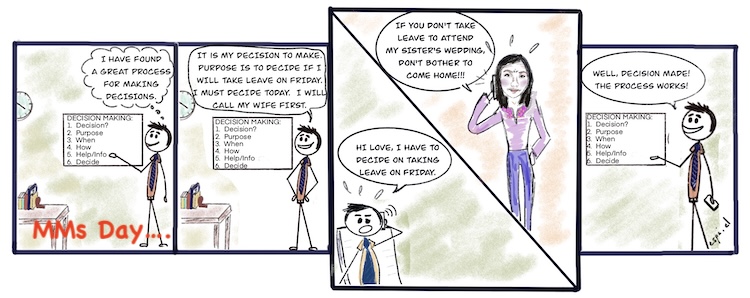Stuck between Senior Management and Frontline employees, middle managers have many decisions to make.
Decisions have to be made as they translate corporate strategy and policies into workable implementation plans.
Decisions have to be made about resources such as budgets, people and time.
Decisions have to be made about addressing problems, of which there are no shortage.
Decisions have to be made on a vision for their area of responsibility and how to develop individuals and teams, and how best to achieve objectives .
Decisions are never in short supply for middle managers.
What this article covers
Parts 2 and 3 of “Decision making for Middle Managers” will provide some ‘how-to’s’. Part 1 will look at some important concepts that lay the foundation for decision-making.

What is a good decision?
Decisions lead to action being taken or not.
A decision to take no action is a decision.
It is common to judge a good decision based on what happened when the decision was implemented, whether action was required or not.
This leads to defining a good decision as one that produced the results for which you hoped.
Consider:
1. You put a lot of effort into deciding with your family to go on holiday to a wonderful resort that will be ideal for everyone. Then it rains non stop during your time there. Was that a bad decision?
2. You work with your team to redesign a process to offer customers a rapid decision for mortgages of 5 days! Then a competitor advertises a 3 day turnaround in mortgage decisions just as you are about to launch the 5 day offer. Was your decision a good one?
I suggest that the best way to judge a decision is to ask how it was made. Both the above events included good decisions, well thought out and implemented. The trouble with judging whether a decision was good or not using outcomes is that outcomes are the result of so many other factors. How many good decisions were made and then COVID appeared?
A good decision, I suggest, is:
One that is made thoughtfully, considers all relevant factors and takes the values, culture and policies of the company into account.
Principles in making good decisions
The following principles will guide you in being thoughtful when making decisions.
a. Know purpose and timing of decision and keep it front and centre.
b. A decision is a commitment to specific actions.
c. You decide when a specific decision is needed. This is usually linked to a problem or choice. A choice is actually a problem to be solved (where should we hold the Christmas party?).
d. Decisions must be able to be executed.
e. Decisions must be made in a systematic way. Use data converted to information over gut-feel.
f. Decisions must be consistent with your, and the company’s, culture and values (often expressed in policies).
g. Bring others in to obtain multiple viewpoints. Seek out the viewpoints of those opposed to avoid missing blindspots.
h. Decision making is a process, seldom a single event.
i. Decision making is not a contest, it is a collaborative way of making good decisions.
First two decisions
1. Do I have to make a decision?
2. If yes what is the purpose of making the decision?
As managers we often feel that, confronted with a decision to make , we have to make it immediately! Saying that a decision is not needed or not needed now, is, of course a decision and often a good one. The ‘not now’ decision speaks to principle ‘e.‘ above.
The purpose of a decision will depend on the nature of it.
– To agree or disagree to a request.
– To determine the price of product X to increase revenue and increase market share.
– To develop a strategy to increase productivity.
– To reduce safety violations to zero.
Decision 3 onwards
Ask when will this decision needed to be made?
When answered, the next logical thing is to ask yourself is “How will I approach this decision?”
The above principles say bring in others, use data and determine the process to be used.
Decision: Who will I include in my decision making process? Remember blindspot elimination.
Decision: What data do I need? Where do I get it?
Clean up your purpose statement so that it is very so that those you involve in the process can be focused on what you are seeking from them.
Including others
Choose one of more persons to help you with the decision. Be clear that you’re not asking them to recommend a decision but you are asking them to suggest factors that you might have to take into consideration. This positions you as the decision-maker and does not lead to debates as to the decision you will make.
Collecting data and information.
It is seldom that perfect information is available to assist you in making your decision.
If perfect information was available it decision making would simply be recognizing the course of action needed.
So except that it is unlikely that you will have perfect information and you will be making a decision based on what is available to you.
What guide you in your decision-making is your purpose or reason for making the decision, your values and those of the company and the degree of risk involved.
An example: as the work from home permission is changing post Covid staff or asked to come to the office three times a week. One individual cites long travelling time as a reason for him not coming to the office three times but just twice a week.
Your face with a couple factors and questions to be asked.
1. HR issued a directive regarding return to work which left you with the decision as to how many days a week will be requested. So there is no policy mandating three days a week.
2. The person making the request has recently recovered from a serious illness and is trave Ing time is two hours to get to work in two hours to get to home.
3. Previously this person came to work five days a week and had made arrangements for overnighting close to the workplace.
4. A question you ask yourself is: if I make an exception in this case how will the others feel and what actions might they take. Would it be fair.
As you can see perfect information is not available to you. So the first thing you have to do is go back to the purpose of the decision.
Your purpose in asking people to be in three days a week (Tuesday, Wednesday, Thursday is to increase collaboration among your staff which has been lacking during the Covid period.
The person asking for the exception is a very important person in the collaborative process given his experience and role.
You worry that if I do not honour his request he might become unhappy and want to seek out another job. You also worry that because of his serious illness he has been pressured by his family to take things easy. The company medical team met with him and his doctor and approved his returning to work.
So based on the above what decision do you make?
Remember that a good decision is one that is made thoughtfully, considers all relevant factors and takes the values, culture and policies of the company into account.
I bet now that you are hoping I will give you an answer! I will not, but use this as an example to say that most decisions do not have perfect information. Whatever decision was made in the above case can claim that the decision-maker considered all aspects of the situation.
There will be more about decision making in the following newsletter next week.

